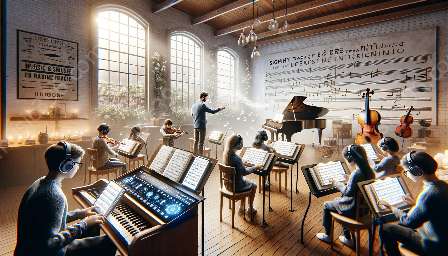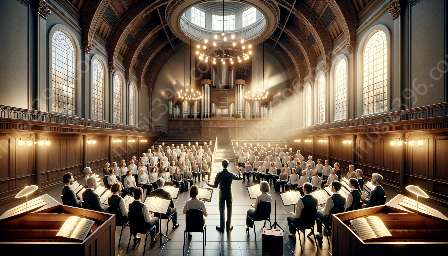Choral conducting is a multifaceted discipline that requires the perfect blend of artistic expression and technical precision. In order to achieve this balance, conductors must possess a deep understanding of the music, as well as the ability to effectively communicate their artistic vision to the choir. This topic cluster will explore the challenges and strategies involved in achieving this balance, and how it pertains to the field of music education.
Understanding the Artistic Expression in Choral Conducting
Artistic expression in choral conducting involves bringing the music to life by infusing it with emotion, interpretation, and creativity. It requires a deep understanding of the composer's intent, historical context, and the musical structure.
Conductors must be able to convey their artistic vision to the choir, shaping the sound and phrasing to reflect the intended emotional and artistic content of the music. This involves using vocal techniques, dynamics, and expressive gestures to inspire the choir and create a captivating musical experience for the audience.
Embracing Technical Precision in Choral Conducting
On the other hand, technical precision in choral conducting involves mastering the fundamentals of music theory, rhythm, and vocal techniques. It requires a meticulous attention to detail and the ability to execute complex musical passages with accuracy and clarity.
Conductors need to be adept at providing clear and concise beat patterns, navigating intricate harmonies, and ensuring precise intonation and diction from the choir. Technical precision forms the foundation upon which artistic expression can flourish, as it enables the conductor to convey their musical ideas effectively.
Strategies for Balancing Artistic Expression and Technical Precision
Achieving a harmonious balance between artistic expression and technical precision requires a conductor to employ various strategies:
- Studying the Score: Conductors must immerse themselves in the musical score, understanding the compositional intricacies, and historical context. This enables them to make informed interpretive decisions while maintaining respect for the composer's intentions.
- Developing Efficient Rehearsal Techniques: Effective rehearsal planning and management allow conductors to address technical challenges while leaving ample space for artistic exploration. Clear communication and efficient use of rehearsal time are essential.
- Cultivating a Collaborative Atmosphere: Creating a supportive and open-minded environment within the choir fosters artistic freedom while maintaining a commitment to technical discipline. Conductors must encourage creativity and expressiveness while upholding the standards of musical excellence.
- Continuous Personal Growth: Conductor's ongoing development in musicianship, conducting technique, and expressive communication enables them to navigate the complex interplay between artistic expression and technical precision with confidence and agility.
Relevance to Music Education
The ability to balance artistic expression with technical precision in choral conducting has profound implications for music education:
In music education, students are not only taught the technical aspects of music, but also encouraged to develop their artistic expression. Just as in choral conducting, educators must find ways to nurture both creativity and discipline in their students, ensuring that they receive a balanced musical education.
Furthermore, the skills and insights gained from learning to balance artistic expression with technical precision in choral conducting can be directly applied to teaching and mentoring young musicians. Through this balance, educators can inspire their students to connect with the emotional and artistic dimensions of music while honing their technical expertise.
Conclusion
In conclusion, the art of balancing artistic expression with technical precision in choral conducting is a nuanced and complex endeavor. It requires conductors to harmonize their creative insights with rigorous discipline, ultimately creating a musical experience that captivates both the performers and the audience. This delicate balance is essential not only in the realm of choral conducting but also in music education, where it provides a framework for inspiring and cultivating the next generation of musicians.















